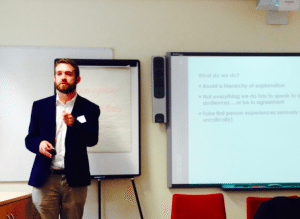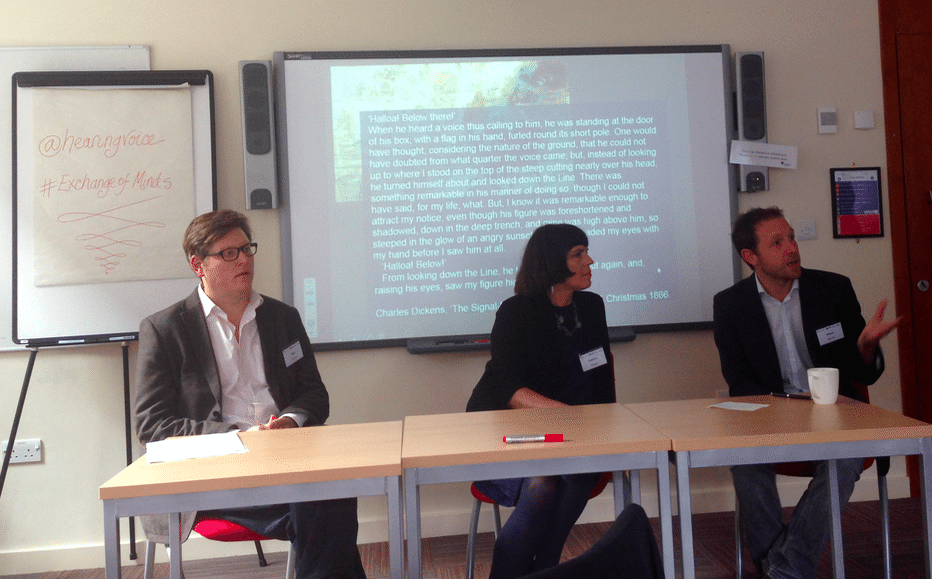Last month Hearing the Voice welcomed delegates from the Academy of Finland’s Human Mind programme to a two-day workshop entitled ‘An Exchange of Minds: So what do you believe?’, which took place at the Palatine Centre at Durham University on 28-29 September 2015.
Facilitated by Mary Robson and hosted jointly by Hearing the Voice, the Academy of Finland, and Durham University’s Institute of Advanced Study, the purpose of the workshop was to showcase cutting-edge interdisciplinary research, facilitate reflection, knowledge exchange and the sharing of best practice around questions of methodology and the challenges of interdisciplinary working.
Some of the highlights from the first day included Ben Alderson-Day’s presentation on the tensions and challenges posed by interdisciplinary research on ‘non-clinical voice-hearing’ – voice-hearing in people who do not have a psychiatric diagnosis and who don’t seek care. Ben explained how taking first-person perspectives seriously and considering voices from spiritual, literary, philosophical, psychological and neurobiological perspectives can involve dealing with ‘multiple models of mind and reality.’ One of the risks of this kind of work is that it leads to conceptual confusion, but it also raises a number of ethical concerns. What, for example, should a researcher do when a person’s beliefs are problematic? When, if ever, is it appropriate for such belief-systems to be challenged? In exploring these issues, Ben drew attention to the many benefits of an interdisciplinary approach. By drawing on innovative ideas and models from other disciplines, interdisciplinary research teams can ‘challenge dogma, reach wider audiences and open doors that would otherwise be closed’.
We also heard from Pat Waugh and Peter Garratt on the representation of voices and inner speech in the work of Virginia Woolf and Charles Dickens, and how examining the way in which writers experience their own processes of creativity and create fictional worlds can deepen and enrich clinical understandings of voice-hearing. Marco Bernini explored how insights from narrative theory can help us better understand auditory verbal hallucinations, shed light on many features of distressing voices (e.g. omniscience), and also have important implications for therapeutic practice. Other high points of the first day include Ulrike Maude on neurology, hysteria and Freud; Sam Wilkinson on ‘interrogative pragmatism’ and scientific explanation; and HtV project director Charles Fernyhough’s presentation on the varieties of inner speech, the different ways we can study it, and the value of reading some forms of voice-hearing as inner dialogue rather than atypical perceptions.
The second day of the conference opened with a workshop led by Jonny Heron (University of Warwick) and Mary Robson on the challenges of interdisciplinarity. Marja-Liisa Honkasalo (University of Turku) also treated us to an introduction to the Academy of Finland’s Human Mind programme, which aims to draw on insights from different disciplines in order to produce deeper knowledge and understanding of the human mind, its neural basis, development, adaptation and functioning within a cultural and social context.
Finally, Susanne Ådahl gave a fascinating presentation on ‘Does the mind create voices? Lay explanatory models of voice-hearing’. Reporting on the Academy of Finland’s Mind and the Other project, Susanne explained how she has gathered data on Finnish voice-hearers’ explanations of their experience through detailed interviews and diary reports. By investigating the manner in which people frame, situate and learn to experience voices, she argued, we can gain an insight into the forces that shape the nature of voice-hearing experiences themselves. Other questions that Susanne’s research focuses on include: How do people’s explanatory models shed light on the cultural values attributed to voice-hearing? And in what ways do voices and the people hearing them shape social identity and subjectivity within the voice-hearers community? Susanne is also particularly interested in the role of stigma in how people deal with their experiences, and how this can lead some people to withdraw from social circles and communities.
Overall, the workshop was a great success. Hearing the Voice would like to thank our friends at the Academy of Finland and our colleagues at Durham’s Institute of Advanced Study for the opportunity to showcase our work and and explore the challenges and opportunities of interdisciplinary research on voice-hearing in such a useful and productive way.
For more information on ‘An Exchange of Minds’ please download the workshop programme.



